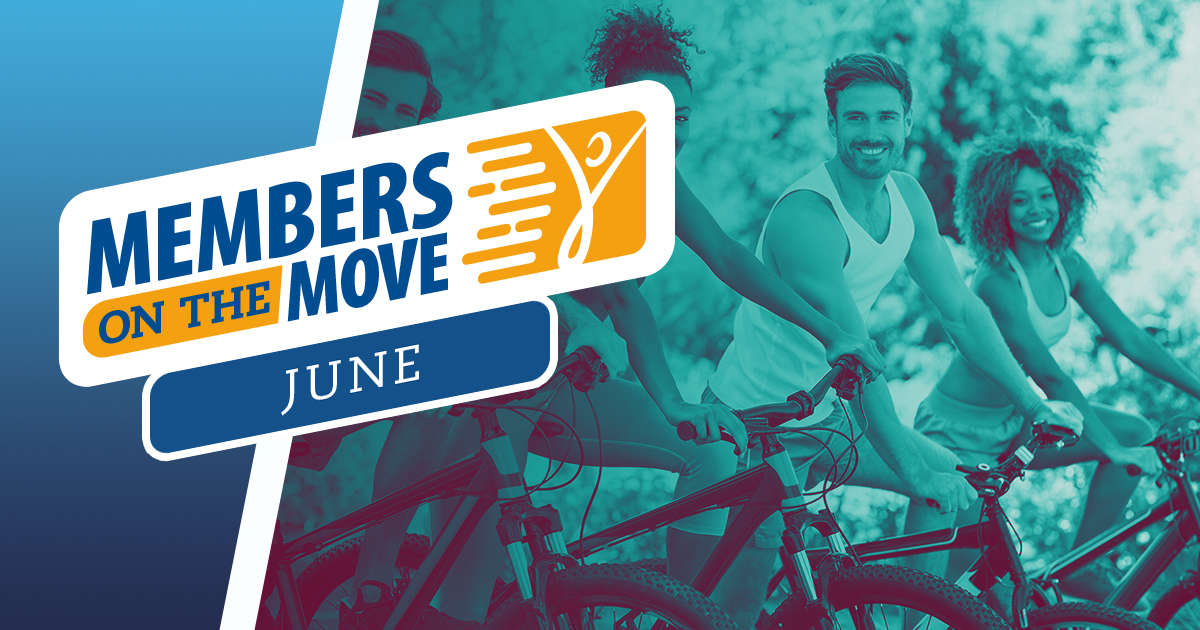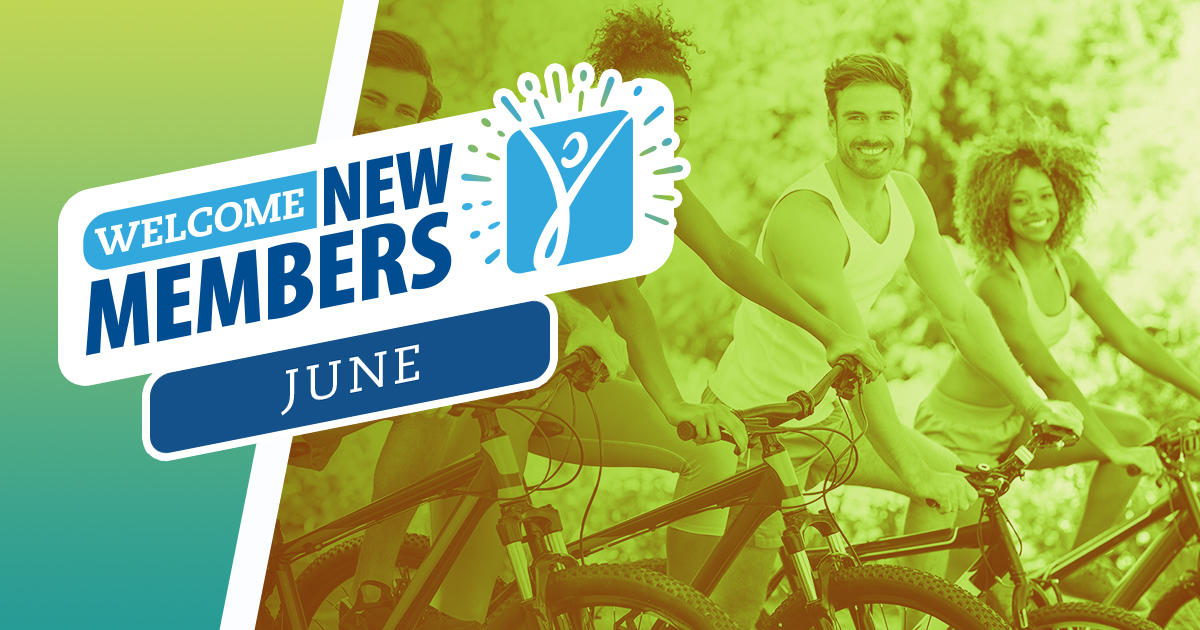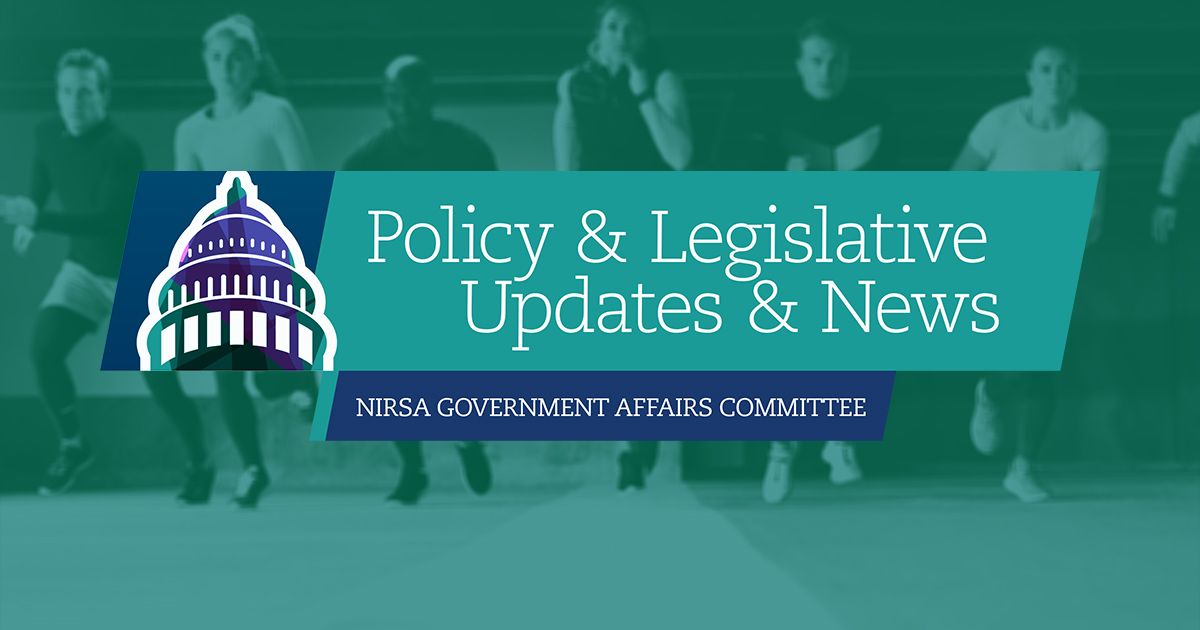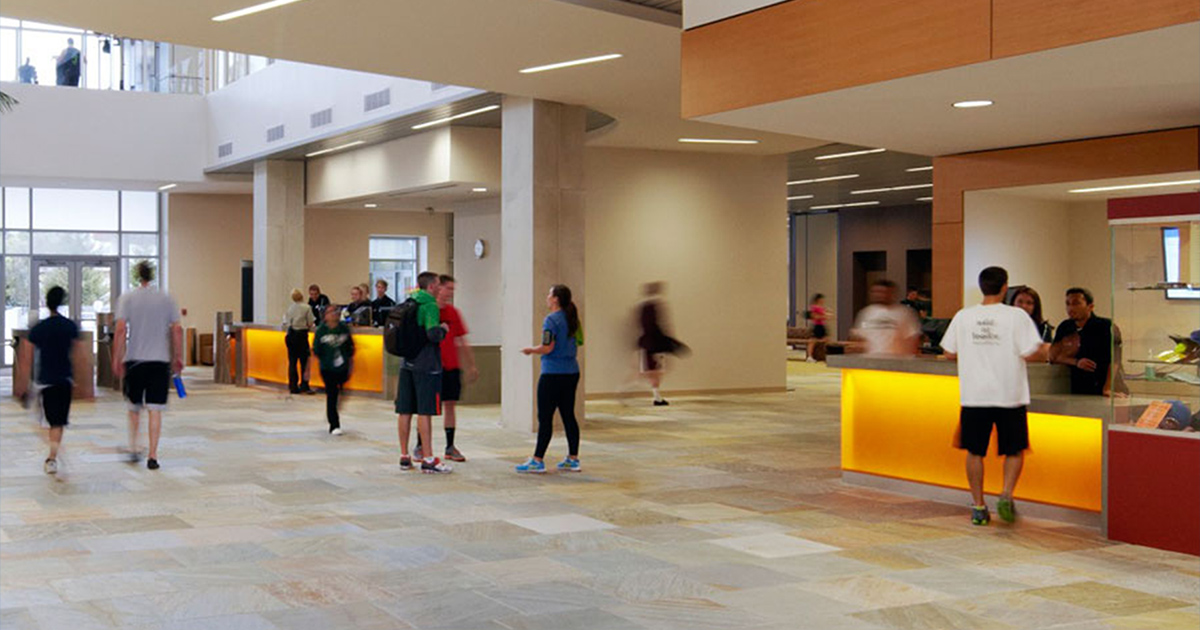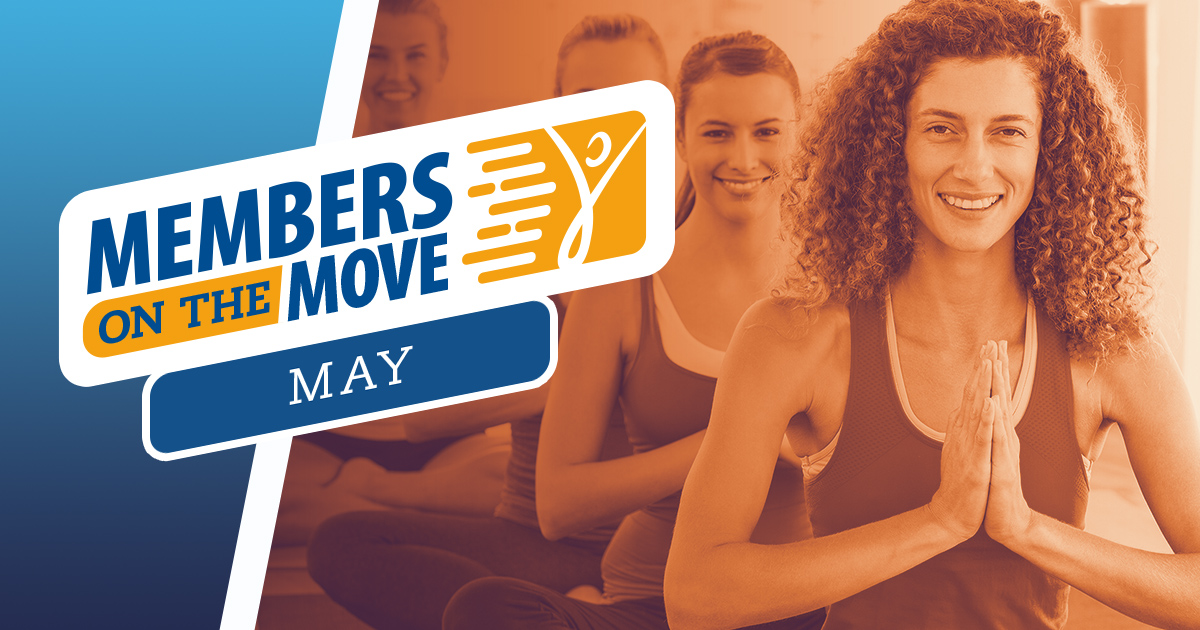By Erin O’Sullivan
“My first mentor, ever, was my swim coach, Jerry…
we spent 10 years together,” reflects Jeana Carow.
“It wasn’t just about swimming for us; it was about becoming a good person…I could talk to Jerry about anything and he would listen without judgment, just be a set of ears for me…
I’m still in contact with him to this day.”
After leaving her hometown pool behind to attend college, and then graduate school, Jeana found other inspiring listeners—people like Mo McAlpine, Marlene Wong, Eric Wojtowicz, David Hall, Dave Leach, and Stacey Hall, who helped her discover and pursue her calling in collegiate recreation and NIRSA—who took the time to hear her, guide without judging, and encourage her to find her own way. These four individuals all helped Jeana find something else as well—her passionate interest in mentoring.
When it came time to produce her Master’s thesis, Jeana remembers realizing, “it wasn’t so much about research for me; it was about wanting to tell my story, knowing that others had experienced the same thing [with mentoring]. It was a phenomenon I wanted to spotlight because, at the end of the day, mentoring relationships and experiences are why NIRSA and campus recreation are so special.”
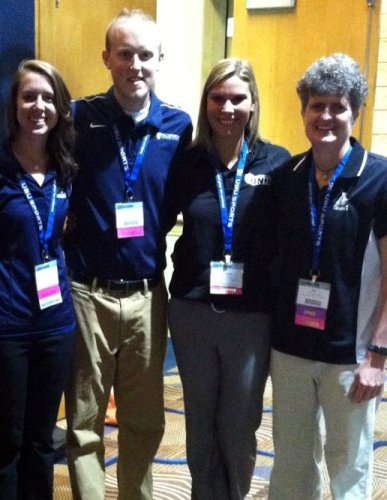 Mallory Gohl, Dan DeMerit, Jeana Carow, and mentor Mo McAlpine presenting “911: What’s your emergency” at NIRSA 2012.
Mallory Gohl, Dan DeMerit, Jeana Carow, and mentor Mo McAlpine presenting “911: What’s your emergency” at NIRSA 2012.It makes sense to Jeana that the NIRSA students she interviewed for her thesis, Positive Mentoring Relationships: The Lived Experiences of NIRSA Student Leadership Team Members, were overflowing with positive experiences and insights. As the Association for the profession of collegiate recreation, all those involved with NIRSA deeply understand “the new buildings, great budgeting, new programs, and technological advances are amazing; but, at the end of the day, all those things are being done for the students. It’s not for us working here in campus recreation; it’s for them. To understand that and be a part of a student’s development is a special thing.”
In NIRSA, that ‘special thing,’ affects us all. Though every NIRSA members’ mentoring experiences deserve to be featured, for the sake of this article’s brevity, we asked three members in various stages of their collegiate recreation careers—student, young professional, experienced professional—to share their thoughts with us: Mallory Gohl, Graduate Assistant at University of West Florida and 2013-2014 NIRSA National Student Leader; Jeana, Coordinator of Facilities at Florida Atlantic University; and Vicki Highstreet, Senior Assistant Director at University of Nebraska-Lincoln, who has held many significant roles in NIRSA—including Past President, faculty member and chair of NIRSA School of Collegiate Recreation, presenter at the upcoming Emerging Recreation Sports Leaders Conference, and Horace Moody Award recipient—and whose mentoring impact has even been picked up on social media via the #MamaVic hashtag.
NIRSA’s culture of mentoring
Jeana’s research puts into words a truth that is integrally felt throughout the Association—NIRSA, seemingly more than most, is infused with a “culture of mentoring.” All of her interview subjects, “once mentored, [felt] that paying it forward is an important part of their duties as campus recreation professionals and they have intentions to continue doing so.”
Mallory echoes this, noting that “it’s clear that the professionals in this Association truly care about the success of our students… [so] we as students learn the importance of paying it forward and investing in others. It then becomes a cyclical thing! I love it!”
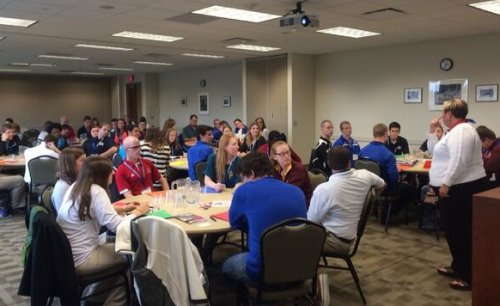 Vicki leading a session at the 2013 Region V Conference, tweeted by @NIRSARegionV with the tag “#MamaVic making the students work hard!”
Vicki leading a session at the 2013 Region V Conference, tweeted by @NIRSARegionV with the tag “#MamaVic making the students work hard!”The root of this cycle, this culture, is not so hard to understand, Vicki says. “NIRSA is one of those unique professional associations where the members truly want everyone to succeed. Sure, we at Nebraska can joke and root hard against other Big 10 teams but, as soon as it comes to collegiate rec, we want them to do well. This lends itself to strong mentorship throughout the Association.”
NIRSA, and, independently, most institutions, try to promote and provide opportunities for mentorship through formal programs that pair students and young professionals up with more experienced professionals. From NIRSA’s Mentor Program to the Annual Conference’s and Emerging Recreational Sports Leaders Conference’s Take-a-Student-to-Lunch event, potential mentors are identified for those involved; the person doesn’t have to search for, or rely on happenstance to find, a potential mentor.
The foundation of mentorships: Caring for the individual
For Mallory, this type of relationship led her to one of her mentors—Greg Jordan. “We were supposed to talk on the phone about NIRSA and the Student Leadership Team,” she says. And they did—at least a little. “After that [first] phone call [though], I literally had to sit and process what had just happened because it was not what I expected! He spent 40 minutes talking to me about my personal life and how I’m balancing school, work, and NIRSA responsibilities. That’s what I love most about mentoring—it’s so unexpected!” What could have been a forced phone call about “business,” transpired quite easily into a conversation about a person.
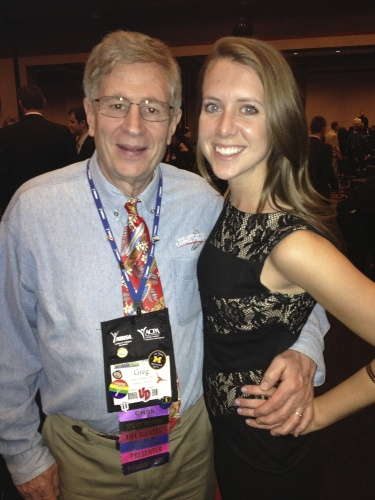 Mallory and one of her mentors, Greg Jordan.
Mallory and one of her mentors, Greg Jordan.That, Vicki says, is what makes all the difference. Caring about the individual is the first step in creating a solid mentoring relationship. “One of the things I remember about the people I consider my first mentors—my grandmother and my high school volleyball coach—is that they were never judgmental and always supportive. Each person comes from different experiences; this is where listening becomes the foundation for a positive relationship.”
It’s so key, she reiterates, to truly listen to each and every person you’re mentoring. “I don’t know your story until you tell me. If I try to solve your problems based upon my experiences, the result will be less than satisfying.” Not to mention, Vicki adds, “if I have conversations based only on my experiences, how does the relationship ever grow and mature? How do we expand?”
Stepping into the mentor shoes
For those naturally drawn to caring about other individuals, it can be tough to recognize the impact they’re having on someone else’s life. The interaction comes so naturally, it hardly seems extraordinary. Even more applicable for NIRSA students and young professionals—those just starting to move from mentee to (mentee and) mentor—their ideas of mentor are shaped by the monumental impact their own mentors have made on them. They assume their everyday interactions couldn’t possibly make that kind of impact.

To the professionals in NIRSA,
Mentoring is priceless. Period. Investing in the future can only do wonders for the association. We are students that are eager to learn from the geniuses of NIRSA. We truly look up to you, your experiences, and your wisdom about the association, and we can only hope to have the impact you all have had on NIRSA! How do you do it? Teach us your ways!
But, seriously, the investment you have already put into the young professionals in NIRSA is marvelous. Don’t stop! By continuing to invest in us, the students, the passion and dedication towards student development will only continue. The mentoring that naturally takes place in this association will blossom. And, we, the Leaders in Collegiate Recreation, will impact millions of students all across the country.
I thank you for your previous work and hope you truly recognize what a wonderful mentoring association you have created!
Love,
Mallory
Mallory, who is aglow when talking about her experiences as mentee, freely admits thinking about herself as a mentor is “challenging.” But, she goes on to note, “I cannot tell you how many times I have sat down with my current boss, Mary Pittman, and said, ‘One day I hope to be as impacting on students as you are.’ Her response? ‘You already are’.”
“It didn’t hit me that I was a mentor until I received this amazing phone call from one of my student employees,” Mallory recalls. She had gotten a GA position and was so thankful for “all the help I had given her in the process. This was one of the greatest feelings in the world—to know that my time and effort helped another individual. I get goose bumps just thinking about it!”
Jeana also recalls “not seeing [her]self as a mentor for a long time.” And, even then, she was quick to focus on how cyclical the interaction was. “I pushed [the young man I supervised] to be the best campus rec employee he could be, and, in turn, he pushed me to be a great supervisor. As much as I believe I helped him, I firmly believe he helped me too. I think this is when I really realized what it felt like to be a mentor.”
Looking back throughout all of her experience in the field, Vicki also recognizes the cyclical nature of mentor/mentee relationships. Especially early on, she says, “I needed them as much as they needed me.” She even recalls that one of her earliest GA mentees would return to take on the role as her boss. “It was wonderful,” Vicki recalls. “We learned from each other; the relationship always felt natural—you just don’t let ego in.”
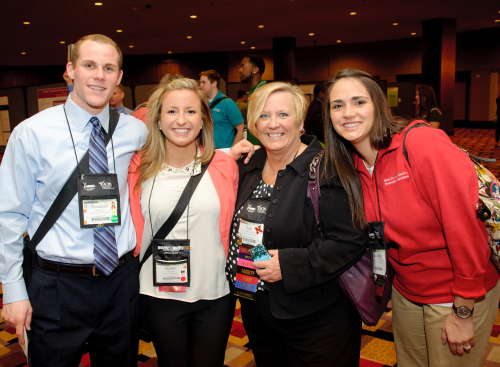 Vicki poses with students at NIRSA 2013 during the Take-a-Student-to-Lunch program.
Vicki poses with students at NIRSA 2013 during the Take-a-Student-to-Lunch program.While not letting ego into the relationship helps the best mentors relate to and invest in their students, it also hinders them from seeing what is so obvious to everyone else—the impact they’re making. Like Mallory and Jeana, Vicki recalls it taking a mentee reaching out to her to allow her to understand the effect she was having. “It wasn’t until I received that first thank you card, which put that ‘mentor’ label on me that I really saw what I was doing as mentoring.” Which just goes to show, letting the mentors in your life know they’ve made an impact is always appreciated.
And keep in mind that mentoring doesn’t have to be defined by a lifelong relationship. Vicki notes, “It’s all in how you define relationship; relationships are not all or nothing. Just because someone is only in your life for a moment it doesn’t mean it’s not valuable. That moment, though, could be all or nothing to that person. We all need support in our lives—be for it ten minutes or ten years. If those ten minutes make a difference, then that’s mentoring.”
Everyone needs mentors
The students Jeana interviewed for her thesis research all described themselves as hard-working, dedicated, and passionate—not surprising to anyone who knows a NIRSA Student Leader!—and these qualities made them good mentees. In a world where there’s never enough time in the day, one might wonder if these students really need someone to spend time mentoring them. Would they not go on to do great things anyway?
While this might be true on some level, our NIRSA interviewees were quite clear that such a simplistic view was doing no one justice. “We all naturally need other humans!” Mallory says. “Regardless of if you’re the best employee, you still need someone to check in on you, challenge you, continue to push you to your best.”
“Being great includes the knowledge that there is always room to grow…no matter how above-average the qualities you have may be. This includes recognizing the necessity to ask for help,” Jeana says. Plus, you can have all these qualities, “but without direction these qualities can [all too easily] be wasted.”
So if everyone needs mentors to push them to their professional best—how do mentors continue to evolve and grow in their role? Experience is, of course, key, Jeana says. “I have learned something different form every mentor that I have had and, if I had to guess, they also have learned something different form each mentee they have had.”
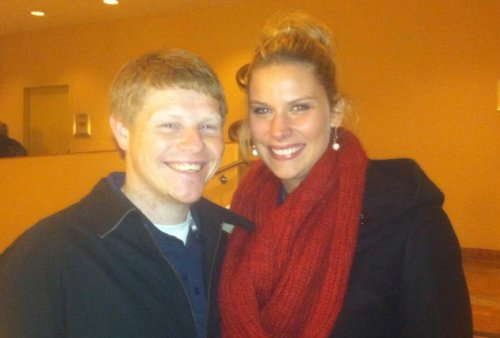 Jeana with mentor Eric Wojtowicz.
Jeana with mentor Eric Wojtowicz.Once you get the basics down—“Always be a good listener; be honest in your communication; show respect for them and their situations; be loyal to them in keeping commitments and extending trust to them; and do not think that as mentor you should advise or solve all their problems”—the skills for being a good mentor “are the same things you need to be a good professional,” says Vicki. And, as such, they continue to evolve and improve as you do.
As time goes by, mentees gain more and more mentors to help them shape their paths as people and professionals. Those relationships then change as mentees move on to different institutions and positions, and that’s a good thing. “I will consider Mo to be one of my mentors for the rest of my life, but she is now a great friend too, and I think that is incredibly important to our relationship,” Jeana says.
And, as mentors continue in the profession, gaining more and more mentees, the rewards grow, and, admittedly, so do the challenges. How do mentors maintain a healthy balance so they don’t neglect their own needs while investing so whole-heartedly in others? “If I knew that,” Vicki says, “I’d be rich from the book royalties! It’s hard to keep a healthy balance when you’re in the business of investing in other people.”
Though a difficult balancing act at times, the core aspects mentorship is built on—trust, listening, support—go both ways. “Have the conversation about time restraints,” Vicki says. “Be honest. Say, ‘I’ve only got ten minutes right now.’ Or say, ‘I can’t talk now, but come back in a bit so I can give you my full attention.’ Otherwise you run the risk of burning out—it’s easy to do. “ Self-awareness, she says is key. “I usually can tell when they walk in the door if I need to talk to them right at that moment or not.”
An investment in the future
Investing in NIRSA students and professionals through mentoring is not only an investment, and gift, to the individual, but to the Association and, by extension, the field of collegiate recreation. “I chose NIRSA [to focus my thesis on] because I wanted to give back,” Jeana says. “ I think of NIRSA as a family and for that family I want to provide information that can help all of us not only do our jobs but remind us of the impact that ‘working at a gym’ can honestly have on the lives of young people.”
That impact, it is clear, cannot be underestimated. For Vicki, whose passion has always been in the development of others, this is a reminder she wears daily—literally. “For my birthday I got a tattoo,” she says. She put a starfish, the symbol of her mission statement, on her hand: “I carry it with me all the time now.”
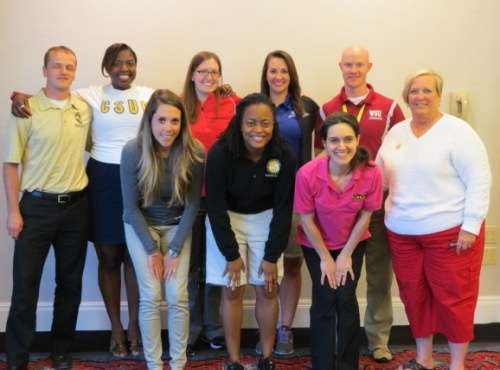 Vicki and students pose between sessions at the 2013 NIRSA School of Recreational Sports Management.
Vicki and students pose between sessions at the 2013 NIRSA School of Recreational Sports Management.The starfish comes from a story about a man throwing starfish that have washed up onto the sand back into the ocean before they die. A stranger comes along and can’t help asking why this man even tries—there are thousands of starfish on the beach and it’s impossible to reach them all. The man throws another starfish into the water and replies, “I made a difference to that one.”
To all the NIRSA members who have listened to and guided others—for minutes or years, to all those who aspire to give as much to others as has been given to them, and to all those who are ever mindful of the guidance and helping hands they’ve been given along the way—thank you.


